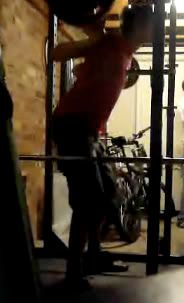The other day, I spoke with a young teen as he entered the classroom. "Good morning!" I said. "Hi.", he replied, but with zero vigor in his voice. Seeing that he was not himself, I asked "Are you all right?" and he said "Yeah", but in a way that implied "Nah". "Is everything okay at home?", I probe getting a little worried. "Yeah. I saw Avatar last night. ...Now,
real life just seems boring."
I tried to answer with something conveying sympathy, but didn't do a very good job. You see, I've spent a good chunk of my life with 'boring', as we all do, and I've kind of grown to like boring, because boring is not very boring at all.
When I was 15, Master Pak, watching the brown belts did not look pleased. "Your side kicks need work. After class, do 1000 side kicks." he said. It took a while. A LONG while. Was it fun? Not exactly. Was it boring? I didn't think so. Not surprisingly, for those of us who finished, our side kicks improved.
Practice for competitive swimmers, especially middle distance and distance swimmers, is probably more boring than most athletes could ever imagine. Hours and hours of looking at the bottom of a pool in a largely sensory-deprived environment. It can be like driving on a straight highway with no scenery, music, or companionship. I've read descriptions of outdoor morning practices, likening the thrashing bodies amid the rising mist to a scene of hell. If you feel it is boring, it will be... and you will suffer. If you can focus on breathing, on technique, on cadence, on pacing, on turns, and on streamlining, you have provided yourself an endless array of challenges. Every stroke, every length of the pool, every breath can be a novel experience.

Years after I stopped competitive swimming and the martial arts, as a graduate student, I worked my way through school driving a bus. Driving the same route all day can be a mindfulness challenge. However, if you strive to make every stop and acceleration as smooth as possible, if you try to take your rear right tire as close to the curb as possible without 'curb-checking' every right turn, if you keep your eyes moving from driver mirror to road to speedometer to road to convex mirror to road, if you smile and greet every passenger, then the time passes quickly... AND, you will become a better driver.
If training, or life, is boring, then it's time to pay closer attention to it, NOT look for some new fix. As "you cannot step twice into the same river", every moment (repetition, meeting) is a new moment and an opportunity for something novel. I think that beats "Avatar", but I don't know - I haven't seen it yet.
Like anger and other emotions, boredom most often fools us into diverting our energies entirely to an external situation. Thus it keeps us from liberating ourselves by seeing our relationship to the emotion itself. We make a great mistake about boredom when we think that it comes because of a particular person or situation or activity.
So much of the restlessness in our meditation practice and in our daily lives derives from this fundamental misunderstanding. How often do we try something new to recapture our interest, something more stimulating or more exciting? And how often does that too quickly become boring and dull, so that we range off again, looking for something "better"?
To realize that boredom does not come from the object of our attention but rather from the quality of our attention is truly a transforming insight. Fritz Perls, one of those who brought Gestalt therapy to America, said, "Boredom is lack of attention." Understanding this reality brings profound changes in our lives.
Then boredom becomes a tremendously useful feedback for us. It is telling us not that the situation or person or meditation object is somehow lacking, but rather that our attention at that time is halfhearted. Instead of wallowing in boredom or complaining about it, we can see it as a friend saying to us, "Pay more attention. Get closer. Listen more carefully."
-Insight Meditation: The Practice of Freedom (pg. 80)
(pg. 80)









